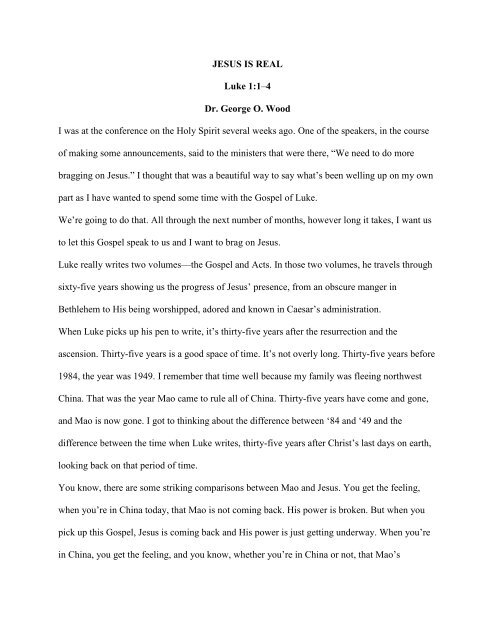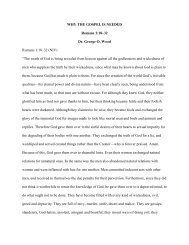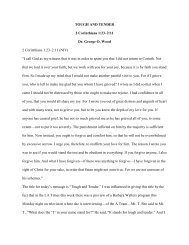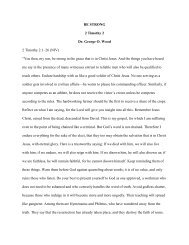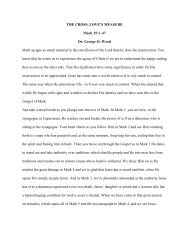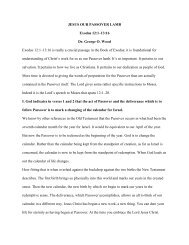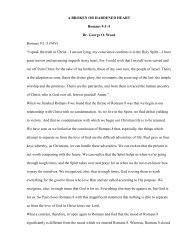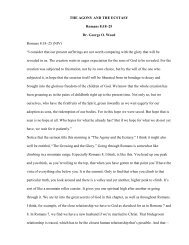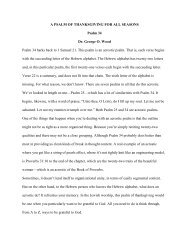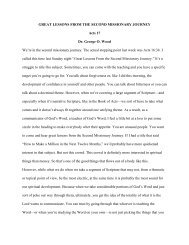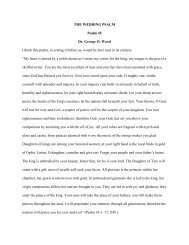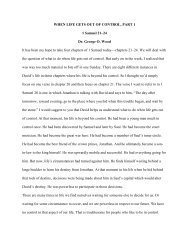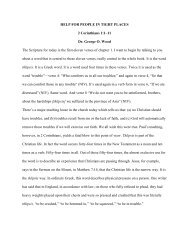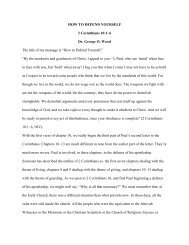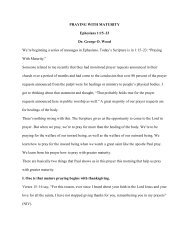01 JESUS IS REAL.pdf - Dr. George O. Wood
01 JESUS IS REAL.pdf - Dr. George O. Wood
01 JESUS IS REAL.pdf - Dr. George O. Wood
You also want an ePaper? Increase the reach of your titles
YUMPU automatically turns print PDFs into web optimized ePapers that Google loves.
<strong>JESUS</strong> <strong>IS</strong> <strong>REAL</strong>Luke 1:1–4<strong>Dr</strong>. <strong>George</strong> O. <strong>Wood</strong>I was at the conference on the Holy Spirit several weeks ago. One of the speakers, in the courseof making some announcements, said to the ministers that were there, ―We need to do morebragging on Jesus.‖ I thought that was a beautiful way to say what‘s been welling up on my ownpart as I have wanted to spend some time with the Gospel of Luke.We‘re going to do that. All through the next number of months, however long it takes, I want usto let this Gospel speak to us and I want to brag on Jesus.Luke really writes two volumes—the Gospel and Acts. In those two volumes, he travels throughsixty-five years showing us the progress of Jesus‘ presence, from an obscure manger inBethlehem to His being worshipped, adored and known in Caesar‘s administration.When Luke picks up his pen to write, it‘s thirty-five years after the resurrection and theascension. Thirty-five years is a good space of time. It‘s not overly long. Thirty-five years before1984, the year was 1949. I remember that time well because my family was fleeing northwestChina. That was the year Mao came to rule all of China. Thirty-five years have come and gone,and Mao is now gone. I got to thinking about the difference between ‗84 and ‗49 and thedifference between the time when Luke writes, thirty-five years after Christ‘s last days on earth,looking back on that period of time.You know, there are some striking comparisons between Mao and Jesus. You get the feeling,when you‘re in China today, that Mao is not coming back. His power is broken. But when youpick up this Gospel, Jesus is coming back and His power is just getting underway. When you‘rein China, you get the feeling, and you know, whether you‘re in China or not, that Mao‘s
<strong>JESUS</strong> <strong>IS</strong> <strong>REAL</strong>Luke 1:1–4accomplishments were based upon the shedding of others‘ blood. He exercised hisadministration through naked power and force. When you read this Gospel, you find that Jesusexercised His power solely by means of love. His administration was based also on the sheddingof blood, but it was His own blood and not another's. When you look at Mao, you find that whenhe left, he left his followers divided. They were in a competitive condition for control. But Jesusleft His followers united in a powerful condition to carry His news to the entire world. WhenMao left, there was nothing more. There was no hope for anything beyond this life. Howdifferent from the story of Jesus.When we open to Luke‘s prologue or introduction, verses 1–4, we find something unique in theGospel and something unique in the New Testament. The writer has given a formal statement asto the procedures that he used in penning his Gospel. It is a sentence in the Greek language thatis modeled along the lines of classical Greek. In fact, although in our modern Englishtranslations the words are broken up into two sentences, they were actually a very well structuredsentence—one sentence in the Greek language. He adopts the formal style of classical writers ofthe ancient world, whether it be Josephus writing the history of the Jewish people, or the Greekmedical men such as Hippocrates, or historians like Herodias or even the biographer Plutarch. Hebegins like that. Setting out this story in the style which would address it as a serious historicalwork, worthy of consideration by all.―Many have undertaken to draw up an account of the things that have been fulfilled among us,just as they were handed down to us by those who, from the first, were eyewitnesses and servantsof the Word. Therefore, since I myself have carefully investigated everything from thebeginning, it seemed good also to me to write an orderly account for you, my most excellent2
<strong>JESUS</strong> <strong>IS</strong> <strong>REAL</strong>Luke 1:1–4Theophilus, so that you may know the certainty of the things that you have been taught‖ (Luke1:1–4, NIV).It is obvious from Luke‘s prologue that the intent of Luke‘s writing is to assure us that the storyof Jesus is real. That‘s why I have entitled this message today ―Jesus is Real‖. But in order forcommunication to be effective, three things must be present. There must be someone, first of all,to receive the communication. It does no good to shout in an empty room. Secondly, there mustbe someone to give the communication. No message can be received unless it is given. Andthird, for communication to be effective there must be a message itself. There must be contentwithin that message. From Luke‘s prologue I want us to see how this bridge of communication ismade to us.I. First, there is the receiver of the communication.His name is Theophilus. The letter is written to him. Theophilus simply means ―God‘s friend.‖And both Luke and Acts were addressed to him. We really know nothing about who he was.Some guess that he was a Jew wearing a Greek name. Others have said, ―No, he was Greek.‖Some have suggested that he was a patron of Luke and made his work financially possible bysupporting him so he could do his research and writing and publish his Gospel. Others havesuggested that he may be a governmental official or simply a citizen of some standing. We donot really know whether he was a Christian or a non-Christian. There are people who think hewas Christian. There are people who suggest that he was not. We only know that his name means―God‘s friend.‖ That his title is ―most excellent,‖ suggesting that he was a person of standing inthe society. And that the Gospel was directed to him personally.It‘s not as though Luke was only writing to him. Luke certainly was aware that a great readershipwould come to know the Gospel that he writes. But he writes it first to Theophilus. While he may3
<strong>JESUS</strong> <strong>IS</strong> <strong>REAL</strong>Luke 1:1–4be writing for the whole world to read, he has sense enough to speak to one person. If there isanything that I have learned about watching great communicators, is that they have alwaysspoken to one person. I was at a conference some time ago where I came up against that ideaagain that preaching is the idea of reaching for a mic and screaming into it, as though you have toyell if there‘s a crowd. Luke has the wisdom to know that if you‘re going to communicate, youreach the heart of one person and you‘ll reach everybody‘s heart.It pleased the Holy Spirit to not let us know more about Theophilus so that the Gospel would fitus better. Maybe Theophilus was like some of you…a new believer who had begun to strugglewith whether or not his decision to follow Christ had been the right decision. Theophilus needsto know whether or not he had made the right choice. Maybe you need to know that.Perhaps Theophilus had already encountered some of the false Christian sects that were inexistence then. There are many cults and groups that are in existence today. Maybe Theophilusknew that in some of the communications about Jesus that were circulating there was a lack ofcredibility in the account—there are well-intentioned but mindless Christians who tell stories thatseem good but aren‘t really true. We‘ve had many stories recently in charismatic circles thatwere somewhat far-out on the ministry of angels. In my opinion, far-out. Nondocumentedstories; hearsay that simply grows with the telling.Maybe he had experienced disillusionment with other believers. He came to find out that bornagain Christians can be people who have real failures and missteps.Maybe he was just discouraged with himself or was going through a great battle in his own lifethat was testing him to his very core and he was wondering, ―Did I make a right choice?‖4
<strong>JESUS</strong> <strong>IS</strong> <strong>REAL</strong>Luke 1:1–4Maybe he had begun to encounter the cost of serving Christ, or opposition directed against him,or tragedy that had struck his life for which there was no ready answer. As a new believer, he isgrappling with these things.Maybe you are like that: a new Christian or even an old Christian who needs grounding, a floorupon which your faith can stand.Perhaps Theophilus was not yet a Christian. Maybe he had the perspective that ―Christianity isinteresting, but I‘m not really ready to grant that it‘s the truth.‖ Maybe he came from theassumptions that all religions are the same, they‘re all taking us down the same road of findingGod. And that the one God stands over and above them all. Maybe he was saying, ―Religioustruth, if it‘s real at all, is only subjectively real. It will never be objectively real.‖ Whensomething is subjectively real, its reality can only be measured within your own experience, andtherefore, the test of that religion becomes, how sincerely do you practice it? And if you practiceit sincerely, then what could be wrong with that?Maybe Theophilus wondered if a thinking person could be a Christian. He may have beeninfluenced by the kinds of attitudes that are seen in <strong>George</strong> Gershwin‘s Porgy and Bess.Remember Porgy and Bess, where the character who was eventually responsible for breaking upPorgy and Bess himself breaks up a Sunday School picnic by singing, ―It ain‘t necessarily so. Itain‘t necessarily so. The things you are liable to read in the Bible…it ain‘t necessarily so.‖Maybe Theophilus had that kind of idea about Jesus, ―It ain‘t necessarily so.‖Maybe you are like Theophilus, an inquiring non-Christian who looks for evidence that willconvince him. Whether Christian or non-Christian, this book will speak to you with certaintyabout Jesus.5
<strong>JESUS</strong> <strong>IS</strong> <strong>REAL</strong>Luke 1:1–4II. The second thing that is needed for communication: Not only does there need to be onewho receives the communication which now is us but there is a second part, the giver ofcommunication.What do we know about the writer of this Gospel, just from the first four verses? We knowseveral things about him.A. We know, first of all, that he does not name himself. We could do a detective story here andkind of identify him by looking at other parts of Scripture. Let me do that for just a moment. It‘swhy we call it the Gospel of Luke. Whoever wrote this Gospel also wrote the Book of Acts. Thisperson was an unnamed companion of Paul. Four times in the Book of Acts (16,20,21,27) heuses the personal pronoun ―we‖. If you want to find the author, you take all of Paul‘scompanions that are named in Acts and immediately exclude them, since the writer never nameshimself in either Luke or Acts. All the names of the companions of Paul can be excluded ascandidates. Go then through the epistles of Paul and find all the names of Paul‘s coworkers notfound in Acts and you have your possible list. But then exclude any persons in Paul‘s letters thatwere with Paul when he wrote letters during the second and third missionary journeys. Then lookat Paul‘s prison letters of persons associated with him in his imprisonment not found in hisearlier letters or in Acts. The only person that emerges is Luke.That‘s how we get there, plus church tradition. What‘s intriguing to me is, he doesn‘t namehimself. Not only does he not name himself but Mark doesn‘t name himself and Matthew doesn‘tname himself and John doesn‘t name himself. What is with these Gospel writers that they nevername themselves? If I were writing a Gospel, I would put my name there. I‘d want therecognition. I‘d get on all kinds of guest shows and I want the royalties.6
<strong>JESUS</strong> <strong>IS</strong> <strong>REAL</strong>Luke 1:1–4But none of the Gospel writers named themselves. I think there are two good reasons why theydon‘t. They have a sense, first of all, that the story they‘re writing doesn‘t belong to them. Itbelongs to all the people of God, and they have no right to personally appropriate it as though itwas something they wrote. It was a truth believed on in the world by the church.But, secondly, I think they didn‘t name themselves because it was not their story they weretelling. It was His story. He must increase. So after reading the first four verses, we find a personwho doesn‘t name himself.B. We also find that this communicator has read other written accounts of Jesus. He indicatesthat many had already undertaken to draw up an account of the things that had been fulfilledamong them. He makes no criticism of what has previously been drawn up. Perhaps there weresome things. Perhaps someone wrote down the Sermon on the Mount. Maybe someone wrote thetime Jesus was traveling in the Transjordan area. Perhaps Luke had before him—and mostscholars think he did—the complete Gospel of Mark as he wrote. Perhaps before him was thestory written by Mary of the birth of Jesus. We just know that he had a number of differentaccounts.These earlier writings were not off-the-cuff kind of remarks. They were things that had beenfulfilled and were handed down. The idea of ―handed down‖ indicates that they had alreadybecome formalized sufficiently that they were regarded as truth embodied in words that werebeing passed on, word-for-word, to others.These written accounts had come from persons who were called ―eyewitnesses and servants ofthe Word‖ (Luke 1:2, NIV). The word ―eyewitnesses‖ is a very instructive word. The Greekword is autoptai. In English, it is the word we derive ―autopsy‖ from. Autoptai is the Greekword. ―Autopsy‖ is the English word. Both are medical terms. It literally means ―to see for one‘s7
<strong>JESUS</strong> <strong>IS</strong> <strong>REAL</strong>Luke 1:1–4self.‖ That‘s what a coroner does when he makes an autopsy. He sees for himself. It‘s to placeunder thorough self-examination. So those who had already written of Jesus were ones who hadfirst-hand knowledge, they had examined for themselves; not people who had believed in abunch of fables or old wife‘s tales or mythology.And they were servants of the Lord, huperetes. Also used in a medical sense. That could be aclue we‘ve got a doctor for a writer. Huperetes literally means ―under rowers.‖ And in themedical language of Luke‘s day, it could stand for interns who served under a physician.Someone has said that a minister sees people at their best, a lawyer sees people at their worst,and a doctor sees people as they are. And Luke got his information from those who had served as―under-rowers‖ to Jesus—interns of the Great Physician.C. The third thing we learn about the giver of this communication: Not only does he not namehimself and has he examined other written accounts of Jesus, but thirdly, we know that he haspersonally and carefully investigated everything from the beginning. He says this in verse 3.―From the beginning‖ simply means that his Gospel goes back to the infancy. Mark‘s Gospelbegins with the baptism, the ministry of John the Baptist, and Jesus‘ baptism and temptation. ButLuke‘s Gospel reaches back to the announcement of His birth. Matthew‘s Gospel takes hisgenealogy back to Abraham. But Luke‘s Gospel reaches the genealogy back to Adam. Luke isconcerned with telling the whole story from the beginning and he has interviewed eyewitnesses.He has not made a superficial investigation. By the way, Luke‘s prologue, saying he hadinterviewed eyewitnesses and he himself had carefully reviewed everything before he wrote,blows to smithereens the notion that the inspiration of Scripture is something magical,mysterious, or hocus-pocus, or spooky, that somebody sat in a dark room with the shades drawnand waited for the Spirit of God to dictate their pen would automatically move across the page.8
<strong>JESUS</strong> <strong>IS</strong> <strong>REAL</strong>Luke 1:1–4Here we have an understanding of Scripture that holy men spoke as they were moved, inwardlymoved and motivated by the Spirit. And as they moved, the Holy Spirit uniquely fitted Hisanointing to their own personality.Luke‘s ability to interview eyewitnesses is an intriguing kind of thing to me in the Scripture;because, when you read Acts and Paul‘s epistles, there‘s only one time in Luke‘s life that we canidentify where he would have had the kind of time he needed to do the Palestinian backgroundresearch and interview the eyewitnesses like Mary and others who knew John and Zachariah andthe like. That one period of time came when Paul spent two years in prison in Caesarea on thecoast in Palestine. And how Luke got to that moment was, up in Greece, Paul had finished histhree missionary journeys, he was collecting an offering for the saints in Jerusalem; he had histeam all ready to go with him to take the offering down to Jerusalem. At the last minute, while hewas still in Corinth, in Acts 20, he hears of an assassination plot against his life. So he sends allof his co-workers, puts them on ships, says goodbye to them because he understands the attack isgoing to occur while he‘s at sea. And by land he goes up north to Philippi and there, at Philippi,he picks up Luke. Suddenly, Luke is with him. Luke then finds himself with Paul when Paul‘sarrested in Jerusalem. And then, while Paul is in jail, Luke has two years free to roam thecountryside, interviewing the witnesses and coming up with the documents that would form thebasis for his Gospel and his history in Acts. Isn‘t that incredible that the Holy Spirit would usethe circumstance of a thwarted assassination attempt to propel into motion the writer who wouldgive us more of the New Testament than any other writer? Talk about God working throughcoincidences in our life!Maybe something happened in your life that seemed so crazy when it happened. There justseemed to be no reason for it. You thought it was delaying or deterring you. God can work9
<strong>JESUS</strong> <strong>IS</strong> <strong>REAL</strong>Luke 1:1–4through those delays and detours to put us in the exact place that He wants us. We owe Luke andActs to a misguided assassin.D. The fourth thing we know about this writer is that he is going to write an orderly account.That is, there is going to be logic and artistry to his arrangement.Luke indeed is an artist with words. He is forever painting wonderful pictures. In fact, one of theearliest traditions of Luke is that he was an artist. He certainly gives us the Gospel that the littlefolks will always love best—the story of the shepherds and the angels and of Mary and Elizabethand Zachariah and little John.III. For communication, you need the recipients and you need a sender, and thirdly, youneed the message itself.The message itself is the focus of Luke‘s entire Gospel but he states his objective right up frontin the prologue, ―When you finish this Gospel you will be certain of the things you have beentaught.‖The Greek word ―certainly‖ is used a number of different ways in the New Testament. Let meillustrate some ways that it‘s used.Acts 5:23, ―We found the jail securely locked.‖ The same word, but this time it‘s translated as―securely.‖ Securely locked.Acts 2:36, ―Therefore, let all the house of Israel be assured of this: God has made this Jesus,whom you crucified, both Lord and Christ.‖Acts 22:30, ―The commander wanted to find out exactly why Paul is being accused.‖Acts 25:26, ―But I have nothing definite to write.‖1 Thessalonians 5:3, ―When people are saying peace and safety…‖10
<strong>JESUS</strong> <strong>IS</strong> <strong>REAL</strong>Luke 1:1–4So this one Greek word is translated in English as ―certain,‖ ―secure,‖ ―assured,‖ ―exactly,‖―definite‖ and ―safety.‖ When you get done with this Gospel, Theophilus or anyone else, youwill be certain, you will be secure, you will be assured, you will know exactly, you will bedefinite, you will be safe. That is what Luke is getting across. Luke is saying that you canabsolutely rely upon the gospel. Jesus is real.Lloyd Douglas tells about a man who went to visit his old violin teacher. When he came to him,he asked this question, ―What‘s new?‖ The teacher thought for a moment and said, ―I‘ll tell youwhat‘s new.‖ He grabbed his tuning fork and banged it. Out comes the ―A‖. I understand fromour musicians that the tuning fork vibrates at four hundred and forty cycles per second and that‘swhat produces the A. When the A had been struck, he said to his visiting friend, ―Did you hearthat? That‘s the A. Upstairs a soprano rehearses endlessly and she is always off key. Next door, Ihave a cello player who plays his instrument very poorly. There is an out-of-tune piano on theother side of me. I‘m surrounded by terrible noise night and day.‖ He picked up the tuning forkagain and plunked it. He said, ―Do you hear that? That‘s an A. That‘s an A today. That was an Ayesterday. And that will be an A tomorrow. It will always be an A. It will never change. That‘swhat‘s new!‖All around you, life may be out of tune. Maybe your family‘s out of tune. Maybe your work isout of tune. Maybe your circumstances are out of tune. Maybe everything just feels dislocated inyour life. If you ask Luke what‘s new, he‘d say ―Jesus is the same yesterday, today and forever.‖If you‘re out of tune, if you‘ll come to Him, He‘ll get your life back in tune. He‘ll give you thecertainty of His presence. The gospel is not a theory, it is not an idea. It is not a philosophy. It isnot even a religion. It is a story of that which really happened; everything in life can go wrong11
<strong>JESUS</strong> <strong>IS</strong> <strong>REAL</strong>Luke 1:1–4and everything can be broken, but this one thing I must have as certain. If Jesus is real, which Heis, it really doesn‘t matter what happens. It matters, but it doesn‘t!The English Book of Common Prayer of 1662 gives this as a prayer for the reading of the Gospelof Luke. ―Almighty God, who called Saint Luke, the physician, whose praise is in the Gospel tobe an evangelist and physician of the soul, may it please thee that by the doctrine delivered byHim all the diseases of our soul may be healed through the merits of the Son Christ our Lord.Amen.‖Closing PrayerOur Father we pray that same prayer entering into this study of Luke; that by the merits of thySon, our Lord Jesus Christ, all the diseases of our soul may be healed. When we‘re in Yourpresence, we can sense any out-of-tuneness that is in our life. We can sense doctrinal out-oftunenessand moral out-of-tuneness. Failure. Discouragement. So we pick up Your Word todayand Your Spirit ministers Jesus as very really to us. We ask, Lord, that all of our hearts would betuned to that of Jesus. As for people that are here today, that are going through struggle in theirlife, maybe feel like they‘re in the middle of some vast swimming pool and they don‘t have thestrength to swim anymore and are going down, wondering if there‘s any lifeline, any hope in life,anything that‘s certain, You are the one that‘s certain. Teach us that, Lord. Teach us, too, torespect the individuality that You‘ve given us. There may be persons here that may be bitter withYou about the way they are, that they‘re not like somebody else. How You use individuals! EvenLuke, so unique in his gifts, You used him. You didn‘t make him be somebody else. Deep in ourheart, O Lord God, tune us into You. Let a holy fire and purity and love and devotion be in ourdepths, the deep of us that makes the core of us, that You fill that place. May You be real in thatplace to us. We ask, in Jesus‘ name. Amen.12


